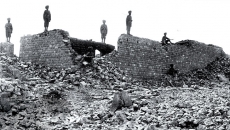You wouldn't think it to watch scenes of honking truck drivers or sign-carrying anti-vaccine protesters, but new survey data suggests Canadians have more trust in their institutions and their neighbours since the COVID-19 pandemic.
Still, Canada is a long way from a national "Kum Ba Yah" sing-along. Cary Wu, lead author of the newly published paper, said that trust is highly correlated with how much money you make.
"Income is a good predictor," said Wu, a York University sociologist who has just published his study in the journal Social Science Research.
"Most Canadians have become more trusting in their neighbours and generalized 'others.' But (some) Canadians have become very much less trusting."
Although previous research has taken snapshots of Canadian attitudes during the pandemic, Wu and his two co-authors wanted to look at how they may have changed over time.
Three theories exist on what happens to social trust during times of social stress. Some researchers hold that people come together; some that they break apart. Others say that levels of social trust are set early in life and subsequent events change little.
"We did find those three types of patterns," Wu said.
The three authors began with a standard Angus Reid survey of about 2,500 Canadians taken in September 2019, just before the pandemic hit. That survey asked a series of routine questions such as: Would you say that most people can be trusted?
Wu took that original data and returned to the same respondents seven times through February 2021.
Canadians are among the world's most trusting people, said Wu, registering levels of trust twice as high as, for example, Americans. Despite COVID, he said, they still are.
For about two-thirds of the respondents, general trust in society and its institutions improved slightly over that time. About 58 per cent trusted their neighbours slightly more after the pandemic than before.
"I was worried about social trust, that there might be a huge decline," said Wu. "But the research shows that's not the case."
About 19 per cent registered little change in their general feelings of trust. Almost a quarter felt the same toward their neighbours as they did before COVID.
But nearly 18 per cent of the respondents registered a sharp drop. When Wu cross-indexed that data with information on income and economic security, the pattern was clear.
"Canadians who are lower-income, lower socioeconomic status, have lost more trust over the pandemic."
It's all about control, Wu said.
A large body of previous research suggests that people who feel they are in control over their lives and can pilot their own destiny tend to have higher levels of trust. Those people tend to be better off economically.
"Across all societies, you'll see people with more income be more trusting."
Trusting is risky. Those with more resources are more able to assume that risk, Wu said.
"It's really about whether these people have the resources to take on the risk. Socioeconomic status is the single strongest indicator of trust, even before the pandemic."
That seems to be what happened in Canada over the course of the COVID-19 pandemic.
"People who are losing trust are people who are lower-income, less powerful," said Wu.
He said the study holds a powerful lesson for any politician interested in building a more cohesive Canada.
"Inequality is a predictor of why trust is becoming lower and lower. We need to think about how to promote trust."


